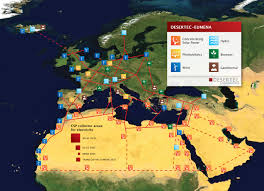With a team of African Development Bank experts, at the margin of the various Bank events in Morocco, the Vice-President in charge of Governance, Agriculture and Human Development, Aly Abou-Sabaa, on Thursday, October 16, 2014 visited a Bank cherished solar power plant project (NOORo1) in Ouarzazate, which energy specialists are calling “the world’s largest using concentrated solar power technology.”
The Vice-President, accompanied by the Bank’s Resident Representative in Morocco, Yacine Fal, the project task manager, Adama Moussa, and a Bank Communication expert, held a technical meeting with the project implementing unit, the Morocco Agency for Solar Energy (MASEN). NOORo1 consists of the construction of the one thermo solar plan with a gross capacity of 160 megawatts, using solar energy collected in a field of mirrors (parabolic collectors) as the primary energy source. It is the first phase of the 500 MW Ouarzazate solar complex project, which is being built on an area of 3,000 hectares.
NOORo1 is structured on approximately 700 hectares, as a public-private partnership (PPP) and includes a system of thermal energy storage using molten salts, which allows the power generation even when there is no solar radiation, to effectively function at full capacity for three hours.
In engaging in this project, the Bank Group has contributed in providing an appropriate and long-term response to factors that undermine inclusive growth in the continent: lack of infrastructure and limited access to energy. With the effective implementation of the Ouarzazate solar plan, Morocco will be on track to achieving these goals as outlined by the African Development Bank.
“Energy is vital to efficiently drive African economies and its impact is recognized. This plant is an important step in Morocco’s green and inclusive growth strategy, and should be replicated all over the continent,” Abou-Sabaa said, adding: “Businesses and industries permanently need power to run smoothly. And any African nation to grow to maturity and become a force to reckon with in upcoming years should develop it.”
Moussa also affirmed that “this huge solar project will positively impact beneficiaries in the project zone, as well as the entire country, in terms of productivity for SMEs and SMIs [small and medium industries], and job opportunities for the youth. It will help diversify the Kingdom’s energy production sources a well.” During the visit, the Bank team noticed the presence of more than 1,700 workers actively performing on the project site, of which 90% are Moroccans. More than 30% of all the workers are natives of Ouarzazate region.
The Moroccan driver, a native of Ouazarzate, who drove the team to the project area said, “Women in this country need energy at home for cooking, lighting and powering electronic devices.”
The project is structured as a public-private partnership (PPP) between MASEN and a consortium led by the Saudi International Company for Water and Power (ACWA Power).
It is the third of its kind that the AfDB is financing in the country’s renewable energy sector after the Ain Beni Mathar Solar Power Plant and the Integrated Wind, Water and Rural Electrification Project.
The official launch of the first phase of the Ouarzazate solar power plant took place on May 10, 2013 in the Moroccan rural municipality of Ghessate (Ouarzazate Province), was attended by King Mohammed VI and representatives of the Moroccan Agency for Solar Energy (MASEN) and the African Development Bank (AfDB) Group.
The AfDB has financed the first phase of the works, with EUR 100 million, from its own resources, in addition to a concessional loan of USD 100 million granted through the Clean Technology Fund (CTF).
The Bank plays a very prominent role in advancing Morocco’s development agenda, with a cumulative commitment in the country’s energy sector is estimated at EUR 1.35 billion (15 billion dirhams) out of a total commitment of EUR 10 billion to all economic sectors.
The opening of the Bank’s office in the country (MAFO) in 2006 reinforces the institution’s presence on the ground, and strategically positions it to step up its policy dialogue, technical assistance and capacity-building operations in the country. “The Bank will continue to engage in charting the way forward in Morocco,” Yacine Fal said.








